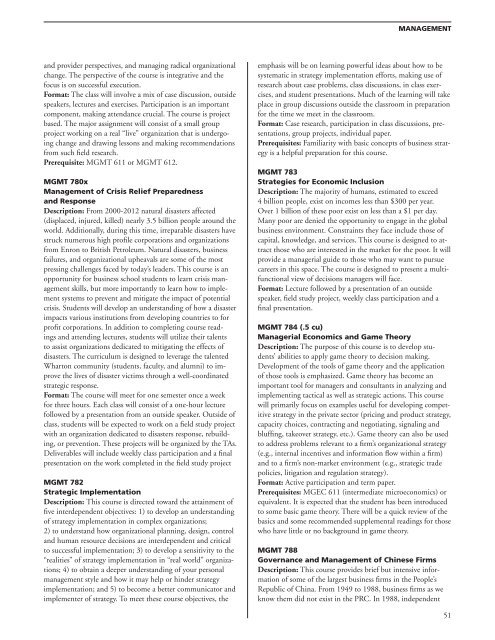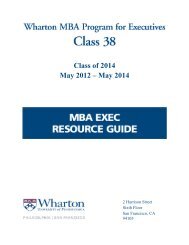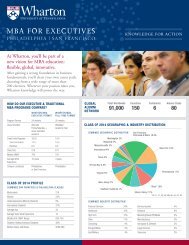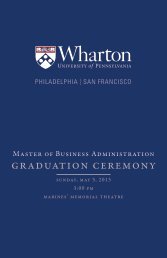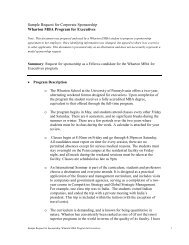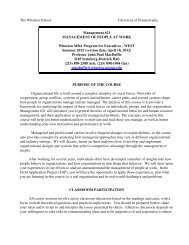Explore Options; Plan Your MBA Academic Program
Explore Options; Plan Your MBA Academic Program
Explore Options; Plan Your MBA Academic Program
Create successful ePaper yourself
Turn your PDF publications into a flip-book with our unique Google optimized e-Paper software.
and provider perspectives, and managing radical organizational<br />
change. The perspective of the course is integrative and the<br />
focus is on successful execution.<br />
Format: The class will involve a mix of case discussion, outside<br />
speakers, lectures and exercises. Participation is an important<br />
component, making attendance crucial. The course is project<br />
based. The major assignment will consist of a small group<br />
project working on a real “live” organization that is undergoing<br />
change and drawing lessons and making recommendations<br />
from such field research.<br />
Prerequisite: MGMT 611 or MGMT 612.<br />
MGMT 780x<br />
Management of Crisis Relief Preparedness<br />
and Response<br />
Description: From 2000-2012 natural disasters affected<br />
(displaced, injured, killed) nearly 3.5 billion people around the<br />
world. Additionally, during this time, irreparable disasters have<br />
struck numerous high profile corporations and organizations<br />
from Enron to British Petroleum. Natural disasters, business<br />
failures, and organizational upheavals are some of the most<br />
pressing challenges faced by today’s leaders. This course is an<br />
opportunity for business school students to learn crisis management<br />
skills, but more importantly to learn how to implement<br />
systems to prevent and mitigate the impact of potential<br />
crisis. Students will develop an understanding of how a disaster<br />
impacts various institutions from developing countries to for<br />
profit corporations. In addition to completing course readings<br />
and attending lectures, students will utilize their talents<br />
to assist organizations dedicated to mitigating the effects of<br />
disasters. The curriculum is designed to leverage the talented<br />
Wharton community (students, faculty, and alumni) to improve<br />
the lives of disaster victims through a well-coordinated<br />
strategic response.<br />
Format: The course will meet for one semester once a week<br />
for three hours. Each class will consist of a one-hour lecture<br />
followed by a presentation from an outside speaker. Outside of<br />
class, students will be expected to work on a field study project<br />
with an organization dedicated to disasters response, rebuilding,<br />
or prevention. These projects will be organized by the TAs.<br />
Deliverables will include weekly class participation and a final<br />
presentation on the work completed in the field study project<br />
MGMT 782<br />
Strategic Implementation<br />
Description: This course is directed toward the attainment of<br />
five interdependent objectives: 1) to develop an understanding<br />
of strategy implementation in complex organizations;<br />
2) to understand how organizational planning, design, control<br />
and human resource decisions are interdependent and critical<br />
to successful implementation; 3) to develop a sensitivity to the<br />
“realities” of strategy implementation in “real world” organizations;<br />
4) to obtain a deeper understanding of your personal<br />
management style and how it may help or hinder strategy<br />
implementation; and 5) to become a better communicator and<br />
implementer of strategy. To meet these course objectives, the<br />
MANAGEMENT<br />
emphasis will be on learning powerful ideas about how to be<br />
systematic in strategy implementation efforts, making use of<br />
research about case problems, class discussions, in class exercises,<br />
and student presentations. Much of the learning will take<br />
place in group discussions outside the classroom in preparation<br />
for the time we meet in the classroom.<br />
Format: Case research, participation in class discussions, presentations,<br />
group projects, individual paper.<br />
Prerequisites: Familiarity with basic concepts of business strategy<br />
is a helpful preparation for this course.<br />
MGMT 783<br />
Strategies for Economic Inclusion<br />
Description: The majority of humans, estimated to exceed<br />
4 billion people, exist on incomes less than $300 per year.<br />
Over 1 billion of these poor exist on less than a $1 per day.<br />
Many poor are denied the opportunity to engage in the global<br />
business environment. Constraints they face include those of<br />
capital, knowledge, and services. This course is designed to attract<br />
those who are interested in the market for the poor. It will<br />
provide a managerial guide to those who may want to pursue<br />
careers in this space. The course is designed to present a multifunctional<br />
view of decisions managers will face.<br />
Format: Lecture followed by a presentation of an outside<br />
speaker, field study project, weekly class participation and a<br />
final presentation.<br />
MGMT 784 (.5 cu)<br />
Managerial Economics and Game Theory<br />
Description: The purpose of this course is to develop students’<br />
abilities to apply game theory to decision making.<br />
Development of the tools of game theory and the application<br />
of those tools is emphasized. Game theory has become an<br />
important tool for managers and consultants in analyzing and<br />
implementing tactical as well as strategic actions. This course<br />
will primarily focus on examples useful for developing competitive<br />
strategy in the private sector (pricing and product strategy,<br />
capacity choices, contracting and negotiating, signaling and<br />
bluffing, takeover strategy, etc.). Game theory can also be used<br />
to address problems relevant to a firm’s organizational strategy<br />
(e.g., internal incentives and information flow within a firm)<br />
and to a firm’s non-market environment (e.g., strategic trade<br />
policies, litigation and regulation strategy).<br />
Format: Active participation and term paper.<br />
Prerequisites: MGEC 611 (intermediate microeconomics) or<br />
equivalent. It is expected that the student has been introduced<br />
to some basic game theory. There will be a quick review of the<br />
basics and some recommended supplemental readings for those<br />
who have little or no background in game theory.<br />
MGMT 788<br />
Governance and Management of Chinese Firms<br />
Description: This course provides brief but intensive information<br />
of some of the largest business firms in the People’s<br />
Republic of China. From 1949 to 1988, business firms as we<br />
know them did not exist in the PRC. In 1988, independent<br />
51


